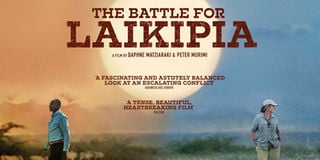
The poster for the film 'The Battle for Laikipia'.
A film about a simmering crisis in Central Kenya whose origins trace back to the colonisation of the country is winning the hearts of viewers in the UK as its tickets sell out in Kenya.
The Battle for Laikipia, a documentary shot over a five-year period which is one of the highlights of the ongoing NBO Film Festival. Its two screenings last week (it was the opening film of the festival) sold out as per the ticketing platform Mookh.
At the same time, the film has since October 4 been showing in cinemas in the UK, and it is striking a chord as it conveys a message about revisiting the impact of colonial settlement in areas surrounded by pastoralists.

Award-winning filmmaker Toni Kamau, who co-produced the film 'The Battle for Laikipia' alongside Daphne Matziaraki.
The Guardian, in its review of the documentary published online on September 30, said: “At once patient and rigorous, this is a film that superbly demonstrates how the conflicts of the present cannot be extricated from the baggage of the past.”
The backstory of the documentary’s creation is a thriller. In 2017, as Kenyans were preparing for the general elections, two filmmakers and their crew travelled to the heart of Laikipia, a region known for its beautiful landscape and rolling plains that stretch beneath the towering shadows of Mt Kenya.
After five years of on-and-off shooting, they returned with a documentary that leaves viewers with a torrent of raw emotions. For some, it is rage or sorrow; while others are overwhelmed with a complex mix of empathy, frustration, and emotions too tangled to name.
Colonial rule
In the first 15 minutes of the film, a viewer’s thoughts are likely to drift to Ngugi wa Thiong’o’s The River Between. In Ngugi’s novel, the conflict is set between two ridges — Kameno and Makuyu — each convinced they were destined to lead.
But in Laikipia, the divide isn’t between ridges. It’s between two distinct communities: the pastoralists, who have roamed the plains for generations, and the ranchers, who settled in some parts of Laikipia under colonial rule.

Simeon, one of the protagonists in the 2024 film 'The Battle for Laikipia'.
As the film reveals, these two groups coexisted in a delicate balance for decades, their lives running parallel, unbothered by the other’s ways. But that fragile peace was shattered. In one scene, a white settler whose great-grandparents remained behind after Kenya’s independence in 1963 reflects on the past with quiet disbelief.
“I never imagined”, he says, “that there would ever be conflict between us.”
Beneath the surface of their quiet coexistence, the world was shifting. Extreme weather events, driven by the relentless force of climate change, were becoming more frequent, pushing their once-separate worlds toward inevitable collision. The once-green grass and lush vegetation the Samburu pastoralists fed their herds on started withering.
“Can the cows graze just along the fences?” one of the Samburu pastoralists pleads with the men guarding a sprawling conservancy.
As the droughts worsened, the once-shared land became a battleground. The film captures this climate-driven conflict with raw intensity, laying bare the emotions and clashes between the indigenous Samburu pastoralists, struggling to keep their cattle alive on the one hand; and white ranchers, fiercely defending their land and livelihoods on the other.
The 94-minute film features Simeon, a Samburu pastoralist and cattle herder, as one of the main protagonists. It also features three white settlers: one with 8,000 acres of land, another with 30,000, and a family that owns 50,000 acres.
In Samburu, “nkishon” means life, and it comes from the word “ngishu”, which means cattle. “For us, cattle is life,” Simon Letoole offers. “We live on what our cows provide us with: milk, broth, blood and sometimes meat. When a Samburu is born, a cow is gifted. And when we die, we are buried in cowhide.”

Peter Murimi, the director of the film 'The Battle for Laikipia'.
He explains that they move year-in-year out, in search of water and rain.
To the family of conservationist Maria, the land and the property within it are their Achilles — their source of pride and strength.
“Take them all past the fence without stopping, do you hear me? And don’t ever enter the ranch again. I have cursed you, and you will die if you ever set foot on this ranch again,” one of the ranch owners warns a Samburu pastoralist. He speaks in perfect Swahili.
Through intimate interviews, breath-taking cinematography, and moments of quiet reflection, The Battle for Laikipia offers a window into the soul of this place. The viewer is pulled into the lives of ranchers protecting their land, herders struggling to feed their animals, and conservationists fighting to preserve the wildlife that has long called Laikipia home.
In one particularly heart-wrenching scene, the pastoralists gain entry at one of the ranches, and more than 1,000 goats are killed. In another moment of raw tension, the pastoralists storm into a building, ransacking rooms and tearing apart property.
Lives are lost. Dreams are shattered. Yet, the two communities feel unheard by the government.
Multiple scenes reveal that beyond the climate-driven conflict, there is a more profound, more insidious force at play — political influence.
Politicians are seen and heard stoking the flames, using the tensions to their advantage, and manipulating a struggle that has remained unresolved since Kenya’s independence. What began as a fight over scarce resources has evolved into something far more complex: a battle over identity, belonging, and the uncertain future of the communities involved.
Conflicts
Yet scientists warn that climate change is worsening, and conflicts will become more frequent as the population grows and resources become limited.
The persisting question is: Is there a way out?
Nation.Africa asked the film’s co-director Peter Murimi (the other director is Daphne Matziaraki from Greece) and its producer Toni Kamau about the film’s appeal to the audiences and the lessons they are picking from the piece that first screened at the Sundance Film Festival in the US in January.
Peter said one of the strengths of the film is the fact that the makers took time to follow the people featured in it and to document the conflict and its nuances.

Daphne Matziaraki, a Greek filmmaker who co-produced the film 'The Battle for Laikipia' alongside Kenyan Toni Kamau.
Toni noted: “It’s a powerful story. It’s also not been told in this way.”
Regarding the UK screening, Peter said the audiences there have “really connected” with it. He noted that the film tries to join the dots of what happened then with colonialism versus what is happening now.
Makers of the film, who cultivated a relationship with people and documented their movements over long periods of time, had to contend with extremely dangerous locations while filming. According to Peter, they would do a risk assessment regularly, and there are places they would avoid, however compelling it was to go there.
“Safety comes first before the story,” said Peter, a multiple award-winning Kenyan documentary director and producer who has worked on various films, among them a BBC investigation on the theft of babies.
The Nairobi Film Festival began on October 17 and will end on October 27.
According to a press release about the festival, it will showcase 17 new feature-length films, 22 new short films and two Kenya premieres of award-winning films being presented to audiences for the first time. The screening venues are Prestige Cinemas on Ngong Road, the Kaloleni Social Hall, and the Unseen Nairobi premises in Kilimani, among others.
Besides The Battle for Laikipia, another documentary that will be aired is Our Land, Our Freedom.
“The people who attended [at the festival screening] were a mixture of industry players and the general public because some people bought tickets online. They sold out quite quickly,” said Toni, an award-winning founder of the production company We Are Not the Machine.
“We are hoping we can do a theatrical release of the feature-like version, but we’re going to have like a one-hour cut-down that’s going to be distributed on a local TV station,” she added.






